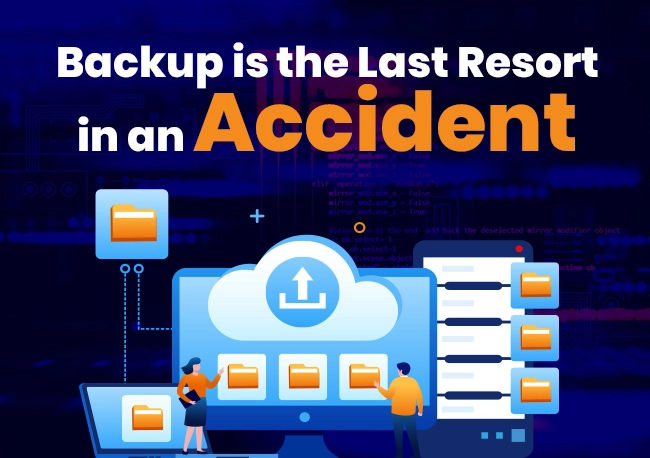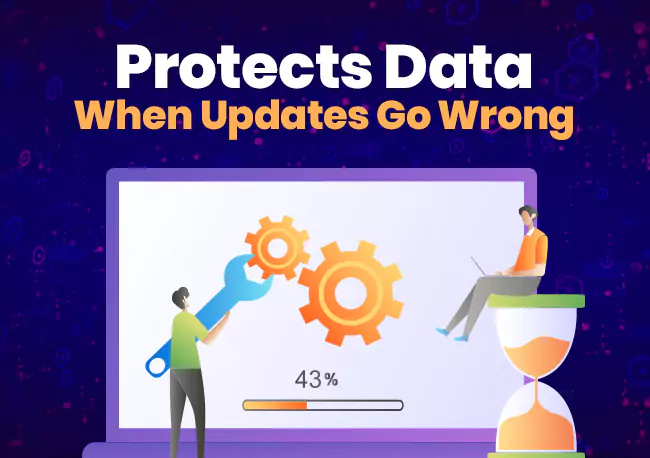Imagine waking up in the morning to the hundreds of emails claiming that your website is down. And, when you check your server, you find your website functioning well, but there are no files and no data in the database – everything vanishes. What would you do now?
Let’s accept it, you can do nothing if you have no website backup plan in place.
People take a lot of steps to keep their business websites safe – from choosing top-notch web hosting services, reliable website frameworks, stunning designs to using strong passwords.
But, one thing that does not seem to draw attention to most of them is to perform regular website backups.
Let’s find what you are losing the most
“A survey conducted by ITIC on enterprise downtime, 98% of business organizations stated that a single hour of downtime costs over $100,000.”
However, the cost is based on various factors and areas. Still, it’s alarming. If you are a small business owner, you need to be more attentive.
Apart from losing your precious data, the downtime can cost you in millions, or even worse, you may never recover and even go out of business.
So, the website backup is the single greatest insurance plan which you must invest in. However, even after knowing the importance of website backups, very few give it a thought and set backup plans for their business websites.
If you are still unable to understand why you need website backups, here are some of the top reasons you should know;
Also Read: Web Hosting Guide For Beginners
1. Last Resort in an Accident

Mistakes happen regardless of how well prepared you are. You or your staff may click the wrong button or make a change that would break some functionalities and more.
But there is a way to avoid these errors – having a website backup plan.
If you assume that your web hosting provider will guard you against all these losses, then you are mistaken. They do have backup plans, but it may be possible that they may not have the latest copy of your website.
Moreover, if something happens and your website loses all its data, you have two options;
- Figure out what went wrong and look for a way to solve it
- Move on with restoring your website with the recent backup
Obviously, the second option seems the fastest way to get your website up and working without getting the word out. So, having your own website backup plan will protect your brand’s integrity.
Also Read: Website Safety With Secure Hosting
2. Protection against Hacking

There is an attack every 39 seconds on average on the web, a study made by Security Magazine suggests. Whereas, a survey conducted by the Breach Level Index says that 75 records are being stolen every second. These are only a few examples but there are thousands such stats available online which suggest that, no matter how well protected you are, a breach can happen.
Hackers are lying in ambush, waiting for you to expose your weakness. The right security precaution is a way to escape it. In case, your website gets
hacked or some important files are stolen, then you have three options to recover them;
- Recover files through email
- Take help of web hosting provider
- Restore the recent backup from your control panel
The first option may or may not work as attackers may change the email associated with the account while the second option is helpful but it may take time. Whereas, restoring the backup can help you return to normalcy quickly.
3. Secure your Site against Crash

Computers crash all the time. You know it well. If you have a backup on your local computer, you are following the best practices, though it’s not efficient enough as even hard drives, sometimes, are not readable. You must have back up plans.
Take a look at the following practices to secure your website data;
- Make at least three website copies
- Keep the first copy on your local computer
- Second copy with the web hosting provider
- And, the third copy should be on the live site
It’s the best way to keep your website data safe from any unknown incidents.
4. Protects Data When Updates Go Wrong

You may often have to update plugins, themes, and the core files if you are using the Content Management System (CMS) such as WordPress. They may not go as well as expected, every time. In fact, you never know what is going on after you press the ‘update button’. Sometimes, the add-on you install may not go well with the site.
That doesn’t mean you should avoid installing them. It simply means you need to take certain precautions. For example;
- Check the reviews of the themes and plugins
- Backup your website before activating the add-ons
So, when things do not go well as expected you will have the option to restore the data quickly without making any interruptions.
5. Protects Files when you create the Website’s Testing Version

There are times when you plan to make core changes and create a testing version of your website. In case, something goes wrong during or after the update, you have website backup to fill the gap.
You can create testing websites using the website staging method. At the same time, when you have a recent backup in place, you can set up the staging copy in no time.
Final Words
These are just some of the top reasons why you should have website backup plans. You can also keep a backup in the data room for which you can discover the best data room providers. However, there are plenty of other advantages to website backup.
- It strengthens your security practices
- It simplifies migrating web hosting process
- It protects you against malware infections
and more…
It’s as necessary as your website and password. So, include this practice in your website management strategy.




